John Janaro's Blog, page 116
September 2, 2020
Pandemic: Faith and the Fragility of Being Human
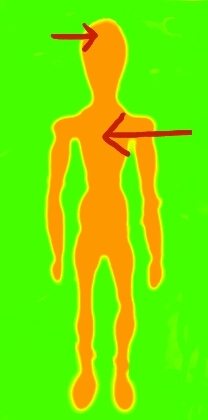 At the beginning of September 2020, the world continues to pass through various kinds of unusual and uncertain situations in the ongoing effort to control the spread of coronavirus, treat those who suffer from it, and learn more about it.
At the beginning of September 2020, the world continues to pass through various kinds of unusual and uncertain situations in the ongoing effort to control the spread of coronavirus, treat those who suffer from it, and learn more about it.Some places have loosened restrictions (e.g. careful attempts are being carried out in Virginia and other U.S. States to reintroduce at least some measure of in-the-classroom education). Other places (such as parts of Latin America) are seeing a return of restrictions due to a flare-up of new cases.
Meanwhile industries and patterns of employment have changed, people have lost jobs, businesses, livelihoods, and it's difficult to imagine how the longer term impact on human society will unfold. And people continue to lose loved ones, compromise their own health, or at least live with an ongoing anxiety about health problems and the continually shifting practices judged necessary to stay safe.
People are afraid. They are battered (physically and/or psychologically) into exhaustion and traumatized by this ongoing vivid experience of their own profound vulnerability.
This overextended fear keeps people in a state of tension, always aware of the threat of great personal losses if the objects of these fears were suddenly to come upon them. Indeed, at this point, every scenario for the resolution of the COVID-19 pandemic seems to entail one form or another of loss, diminishment, and suffering for at least some people. We may become sharp and belligerent, or obsessive beyond all practicality, in our efforts to protect ourselves from being among "those people." Underlying these aggressions, howerver, is fear and anxiety fueled by the recognition that we don't have the power to guarantee, absolutely, our safety. The fear of loss, and the experience of loss, are traumatic to our human frailty.
No doubt this trauma is intense for those who see their horizon of attainable happiness as limited to the empirical world that they can measure - to a world that holds no promise for transcendence. Indeed, it is terrifying to be helpless and alone and losing something (or someone) into the void of a meaningless universe that is not held in the hands of Infinite Love. So many people are afraid that life has no meaning, that love doesn't win in the end, that everything is swallowed up by nothingness.
But we who believe in and worship God are hardly strangers to this fear and sense of helplessness (and if we are honest, the fact that faith doesn't simply take away our fears and the experience of our human frailty can be unsetting in itself). But this really isn't so surprising, because faith does not replace or eliminate our humanity. Ultimately we walk by faith in the One who is true, good, beautiful, but also the Infinite Mystery. Faith does not "resolve" the mystery of God or of reality; rather, it brings the mystery closer to us, yet in doing so it also gives us a path and a reason to hope even in the valley of the shadow of death.
The Mystery has entered the history of our lives. Jesus didn't say He had come to explain the often difficult ways and obscure challenges of our lives. He said, "I am the way, the truth, and the life." He said, "follow me" not to form an exclusive club, but (among other things) to draw us more intensely into the experience of being human, all the way to the Cross.
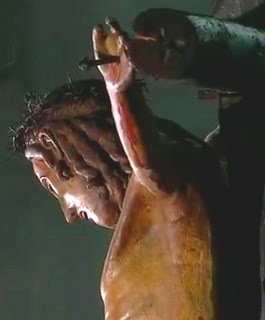 So even in faith we feel this great fragility of being human, this "helplessness" - but we learn that it is rooted in our need to live in dependence on something greater (on the One who lovingly holds our destiny and accompanies us and every human being). Even in the anguish of our lives and the feeling of fear and loss, He is opening a path for us and a "space" inside us so He can lead us and shape for us a good and beautiful fulfillment that we cannot yet "understand."
So even in faith we feel this great fragility of being human, this "helplessness" - but we learn that it is rooted in our need to live in dependence on something greater (on the One who lovingly holds our destiny and accompanies us and every human being). Even in the anguish of our lives and the feeling of fear and loss, He is opening a path for us and a "space" inside us so He can lead us and shape for us a good and beautiful fulfillment that we cannot yet "understand."We live in the world with a HOPE for a transcendent fulfillment in which everything is transformed but "nothing is lost." Often we can't see what this means for our concrete aspirations, circumstances, and relationships and why there is frustration and loss (or "sacrifice").
But Jesus sees; He has endured it all and He is risen. He lives (indeed He IS) the fullness of being human and He stays with us.
In this crisis, and in every human crisis, the power to rise above fear and desperation, the power to find courage, comes from the fact that He has raised up our humanity and (whether we are explicitly aware of it or not) He is with us and He is drawing us to Himself.
Published on September 02, 2020 20:29
September 1, 2020
Life and Death are in God's Hands
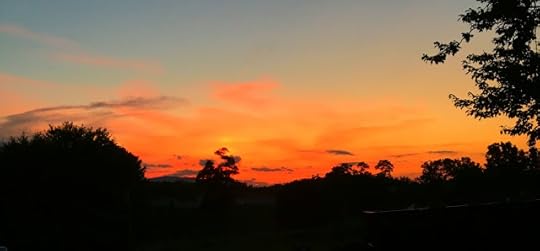
Life and Death are in God's Hands
Lord, you alone know this mystery,
this disjointed and jarring death,
this ending of life
that is happening for some of us now,
for others soon,
for others later.
Death is entirely mundane,
scarcely noticed in the world,
but supremely significant and utterly personal
for each one of us.
Lord, this event that will finally establish who I am, forever...
its coming seems like a rolling of the dice!I know nothing of the day nor the hour.
Perhaps I shall die tonight, tomorrow,
or next week, next month, next year,
or in five years, or ten,
or fifteen, twenty, thirty...
I pray for my life and safety and health,
I try to take good care of myself,
I avoid dangers that I know,
and yet I hold no power that guarantees
a single moment
beyond the present that you, O Lord,
are giving me now.
You alone hold the span of whatever life remains for me,
but my confidence is in you,
for I know that you are good.
Father, you love me, you know me,
you want what is good for me.
You ask me to find my peace by trusting in you
for whatever comes, for whatever remains.
Indeed, these may be my final words, my epitaph,
my last labors, the utterance that precedes
the unexpected sudden stillness of my breath.
Or perhaps years of new, vast, and arduous work
are still ahead of me.
Maybe a road of venerable old age stretches before me,
with an abundance of joys,
with unimagined new cares and responsibilities,
with - finally - achievements I have dreamed of all my life.
Years may yet remain for memory and discovery;
years with harsh miseries too:
a terminal illness to break my nerves,
or a slow decline,
new unremarkable infirmities,
quiet suffering,
powerlessness,
humiliation...
One way or another, however,
I will have to face the end.
I will die.
Dear God, my poor faith tells me
that I am in your loving hands,
that your mercy shapes (especially) this last moment for me,
that your Holy Spirit is here
to guide my remaining steps
with infinite wisdom and utterly personal love,
to lead me into your embrace,
where I will find the only enduring joy.
Still, death is strange.
I don't know what it is like,
when it will happen,
what trials it will require me to endure,
what temptations might rise up
in that unparalleled last second
(Lord, grant me perseverance to the end!)
or what period of purgation,
what intensity of ultimate refining fire I must pass through
to reach you, my Father,
when you come rushing forth lovingly to meet me.
My only recourse is you,
who are so full to overflowing with love for me.
I trust in you.
Whether that final day be near or far,
I host fast to you, my God, in firm hope,
I entrust everything to your goodness and mercy.
I pray for the grace of a good death,
through your Son Jesus Christ our Lord,
who is the resurrection and the life,
your Word made flesh who has made his dwelling with us,
who in dying wins the victory over sin and death,
who has risen from the dead
that we might live forever in the glory of a New Creation.
Published on September 01, 2020 20:23
August 31, 2020
"He's Doing a Lot of THINKING...?" (Video Included)
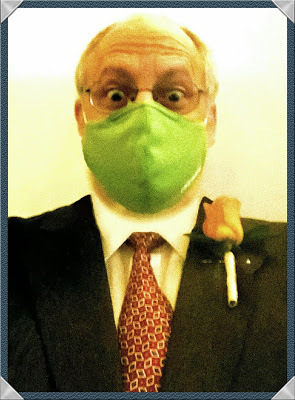 So we have come to the end of August in the year of 2020. The human race has not yet become extinct. That's good news!!
So we have come to the end of August in the year of 2020. The human race has not yet become extinct. That's good news!!And the Janaros had our main event of the year. Everything went off as well as we could have hoped. It was a fine wedding ... with a few distinctively "corona" peculiarities, of course. Perhaps I should use that masked man with the boutonniere as my "Self Portrait 2020."
Actually, people have been grumbling a lot about how awful the year has been, but I don't think any of the problems we are dealing with today will be gone by 2021. There is not much sense in waiting for things to get "normal" ("old" or "new"). This year is actually just bringing into greater focus the chronic abnormality most of us have living in for our entire lives.
Many of us are still affected somewhat by the lingering "atmosphere" of utopian scientism, the presumptuous prejudice that was the motivating (though illusory) aspiration driving "the modern world." It formed in humans (at least in the "first world") the expectation that science and technology could solve, or would very soon be able to solve, all our problems. This was, in fact, an abnormal way of living. Clearly, we are coming to see that the reality of things is "more complicated." We are now living through a traumatic period of transition, in which utopian scientism is simultaneously reaching the peak of its material achievement and being unmasked as a profoundly inadequate set of tools for fixing and perfecting humanity.
New powers and new techniques open up constructive possibilities, but they can also give rise to new problems. As long as freedom exists — wounded freedom, vulnerable to distraction, negligence, and malice — we will have an ongoing flow of human crises and problems that cannot be ended simply by the application of technology, the "forward march" of science, or any kind of social engineering.
Still, we are right to continue to try to make our external circumstances "better," and in this we have good hope of some real success. Sometimes, however, this kind of progress or reform is "messy," with inevitable mistakes, disagreements, and conflicts that arise not only from our failures in relation to one another, but especially from the dramatic character of life itself. This is the real "normal" in human existence: living with the awareness that we are engaged in a drama, with ongoing and sometimes unexpected challenges, and that in order to grow and thrive as human persons we must face these challenges together.
One source of the increasing interpersonal violence we direct toward one another in so many facets of life may be linked to the dizzying speed and power we have become accustomed to exercising over places and things. All this power has exacerbated our (utopian and self-deceiving) tendency to demand that every problem, every obstacle, be resolved quickly and completely or else ignored or denied. But other people come along and make things "messy." These other people who come from different perspectives, with different methods for approaching a problem, people who think and act out of their own experience of life and their own suffering, become intolerable obstacles to us as we seek to implement our (efficient, thorough) solutions and programs.
Thus our ideas become ideologies and "the other people" become enemies. We then feel free to heap contempt upon them.
Of course, it is sometimes the case that "the other people" are wrong. They still deserve to be treated with dignity and respect, to be approached with a genuine compassion (that does not condescend, but truly sees the other as a person). Without allowing ourselves to be tricked or used, we should work together with them as much as we can.
We don't owe respect to discredited movements, ideologies, theories, or prejudices. We don't owe respect to Nazism, Marxism-Leninism, Racism, Obscurantism, Oppression, the Chinese Communist Party, the Ku Klux Klan, etcetera. We are not saying that we have to work with people who identify with these groups or their views. [In some cases, such as the CCP, we may be forced to deal with them because of the extensiveness of their power, but even then we must not compromise our moral principles, we should do whatever we can to help the victims of their violence, and in all cases we had better keep both eyes wide open].
But human persons are always worthy of love and respect. And in crises of worldwide proportions, we need to work together as much as possible. We need to cultivate the art of realistic collaboration, with patience in the face of complex circumstances and compassion for one another in our differences.
In the crises of our time, the way forward is messy. But it is possible to go forward if we do it together, as neighbors, as brothers and sisters.
Too often, however, we continue to fight against one another, smear one another with dirt, condemn one another, "cancel" one another, exclude one another from the status of being human persons with dignity and intrinsic value, and try to humiliate one another. This is not only just plain wrong. It is a "luxury" we can no longer afford.
The consequences of factionalism and strife in the global village will be catastrophic at levels far beyond what we have experienced thus far.
-------------------------------------------------------------------------------
Here is a video, where I don't develop these points. I listen to the river and talk about the fading sun and the shadows of the leaves, and then I talk about the need for cooperation and community. And I say that I don't have "solutions" to offer. I'm "doing a lot of thinking" — not to be evasive but to be thorough.
I'm a plodder. In a world full of InstaOpinions, someone has to plod. Even where I have strong and well-founded opinions that I venture to present, I still continue to plod — thinking things through in different ways, as events unfold, revising or following up on my presentation where necessary. This is what I have to offer: perhaps it will yield, in the end, a few insights, a few words worth saying.
Published on August 31, 2020 17:30
August 28, 2020
Lucia Turns Twenty!
Published on August 28, 2020 22:09
Saint Augustine's "Hundredfold"
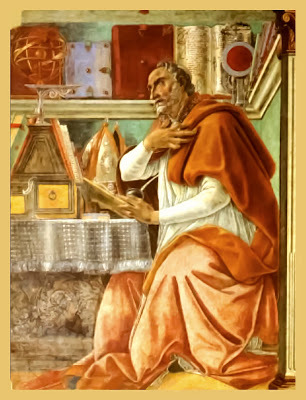 Saint Augustine.
Saint Augustine.There's no end to what we could say about his life, his holiness, his wisdom, his importance as a theologian, philosopher, teacher, and writer.
Here is one particular thing (among many others) that amazes me about him: Saint Augustine is a special example - a witness for the whole world and the entire history of human culture - of what Jesus calls "the hundredfold" (Mark 10:31).
Jesus says that if we follow Him, we will receive eternal life... but also, we will receive a hundredfold in this life (along with "persecutions"). He also says "seek first the Kingdom of God, and all these things will be added as well" (see Matthew 6:33).
What does Jesus mean?
He does not mean the we should follow Him in order to get stuff in this life. That would be to reduce Jesus to our own measure. Jesus wants to transform us according to God's wisdom. He wants to give us a new mind and a new heart. He promises eternal life, which is the mystery toward which everything in this life points, and which is therefore the real meaning of everything in this life.
If we follow Jesus, if we trust in Jesus, we will attain the fullness of salvation - we will live forever in communion with God, in that transcendent joy that God has promised to those who love Him and remain faithful to Him. This is what corresponds to the longing of the human heart, and is the fulfillment that everyone seeks (whether they realize it or not). To amplify this point, Jesus also assures us that if we follow Him, our lives even in this world will be enriched in value and significance beyond anything we could aspire to according to our own measure.
Luigi Giussani often said something that resonates deeply with me, and corresponds to my own experience. He said that if you really follow Christ, you will also discover that you love your wife a hundred times more than you ever could have imagined; that you love your children a hundred times more, your work a hundred times more, your friends a hundred times more. You will discover the real greatness of this life, and you will even be able to embrace suffering.
There is a particular way in which Saint Augustine's life indicates this pattern. Here was a man who set out to be a great rhetorician, a master of articulation and persuasion, an all-around "artist with words." He pursued this ambition with relentless passion, but without understanding its true value. And then he found Christ, and he gave up all thought of being a rhetorician. He gave up the desire to be known for his speeches and writings and works in this world. He longed for Christ, followed Christ, and kept his heart fixed on Christ.
And from out of his singular passion for Christ - without even thinking about it, or caring, or noticing it - he wrote an amazing book. Desiring only to praise Christ, he wrote a book (his Confessions) that was not only the greatest book of its epoch, but one of the greatest ever written in human history. He gave the world inimitable and unforgettable Latin prose, soaring and poetic diction, and timeless, soul-penetrating insight into the heart of the human being.
Aurelius Augustinus the rhetorician and scholar, had he followed his own ambition, might have become a teacher with some following, or even perhaps a minor provincial statesman of his period. Students of late antiquity might have known his name. But Saint Augustine, by following Christ, became also a hundred times more in the history of this world. He wrote books that speak to every time and in every language, and he gave us words that ring out through the ages - words that rival any that have ever been uttered in human speech.
There is something of the hundredfold here, even if he himself didn't perceive it or concern himself with it - even if it has been more for our benefit than for his.
"Late have I loved you, O Beauty ever ancient, ever new, late have I loved you! You were within me, but I was outside, and it was there that I searched for you. In my unloveliness I plunged into the lovely things which you created. You were with me, but I was not with you. Created things kept me from you; yet if they had not been in you they would have not been at all. You called, you shouted, and you broke through my deafness. You flashed, you shone, and you dispelled my blindness. You breathed your fragrance on me; I drew in breath and now I pant for you. I have tasted you, now I hunger and thirst for more. You touched me, and I burned for your peace" (Confessions X:27).
Published on August 28, 2020 10:47
August 27, 2020
The Christian Vocation is an Ongoing Conversion
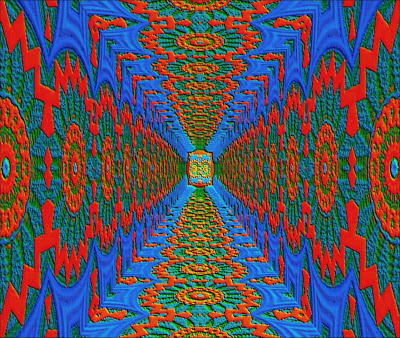 Christian life is a path of conversion from an egocentric posture to an ever deepening habit of authentic charity - an attitude of mind and heart that truly loves other persons for who they are, and for how Jesus makes Himself present to us through their own personal uniqueness. Our Christian vocation takes concrete shape in the Lord's call to love, addressed to us in daily life, in our families, in work and social environments, and on the internet too. And Jesus shapes our lives in such a way as to draw us along the path of loving Him and loving others. Our sufferings, too, are encompassed within this particular plan of healing and transforming love that Jesus has for each one of us as a unique person, whom He embraces in His infinite wisdom.
Christian life is a path of conversion from an egocentric posture to an ever deepening habit of authentic charity - an attitude of mind and heart that truly loves other persons for who they are, and for how Jesus makes Himself present to us through their own personal uniqueness. Our Christian vocation takes concrete shape in the Lord's call to love, addressed to us in daily life, in our families, in work and social environments, and on the internet too. And Jesus shapes our lives in such a way as to draw us along the path of loving Him and loving others. Our sufferings, too, are encompassed within this particular plan of healing and transforming love that Jesus has for each one of us as a unique person, whom He embraces in His infinite wisdom.In answering the call of the vocation to charity, we must have great trust in Jesus, for without Him we can do nothing. But He is with us, working in our lives and teaching us through His Spirit how to grow in genuine self-giving love. We must not become discouraged by our persistent imperfections and selfishness, but continue to work toward cooperating with God's grace and growing in love.
Saint John Paul II speaks of the Christian life as an ongoing conversion, a work-in-progress through which God's love is integrated into every aspect of our lives, bringing personal and social healing and transformation:
" What is needed is a continuous, permanent conversion which, while requiring an interior detachment from every evil and an adherence to good in its fullness, is brought about concretely in steps which lead us ever forward. Thus a dynamic process develops, one which advances gradually with the progressive integration of the gifts of God and the demands of His definitive and absolute love in the entire personal and social life of man. Therefore an educational growth process is necessary, in order that individual believers, families and peoples, even civilization itself, by beginning from what they have already received of the mystery of Christ, may patiently be led forward, arriving at a richer understanding and a fuller integration of this mystery in their lives " (Familiaris Consortio, 9).
Published on August 27, 2020 14:28
August 25, 2020
Thirty Years Ago: Encountering a New Humanity (Part 1)
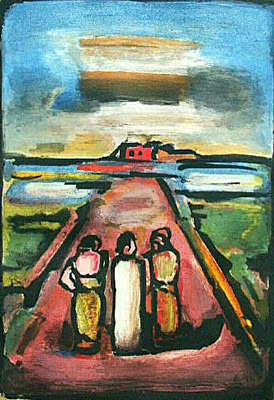 In the midst of this year, with all its confusion, I have had much occasion to remember what happened to me 30 years ago, and how important those days remain for me. I have been struck by this in spite of many distractions (or, rather, it has proven resilient and vital again and again in response to what would otherwise be nothing but frustrating distractions).
In the midst of this year, with all its confusion, I have had much occasion to remember what happened to me 30 years ago, and how important those days remain for me. I have been struck by this in spite of many distractions (or, rather, it has proven resilient and vital again and again in response to what would otherwise be nothing but frustrating distractions).Thus I have recognized and relied on the ongoing relevance of an essential and formative encounter that began for me in those days, and that continues to grow even with my stubborn and complicated character, my strange and peculiar life, and all the resistance of my pride.
It was in the year 1990 that I "first became involved with" a group of Catholic Christians on the campus of CUA (where I was studying theology as a lay student at the Dominican House of Studies). At the time, I saw this involvement primarily as a rather clever choice that I was making to associate with like-minded young people.
Yes, young people. I was 27 years old in 1990.
In spite of the campus meeting place, not many who belonged to this group were students. It was mostly Catholic young urban professionals, men and women in their 20s, well-educated, intellectually inclined, and (with a few exceptions) single.
"Joining this group" was an intelligent choice, one of the few I have really made in my largely hesitant, mediocre life. But it so was much more than "my choice." It was a gift given to me, a crucial event that happened to me. It was a whole beautiful and mysterious path that opened up for my life - a path that was to shape profoundly the ensuing 30 years (though I have often wandered off to the side or moved very slowly during that time).
Every week, the group met for Mass, then gathered in a classroom for what seemed like a disorganized and free-wheeling discussion about how we were experiencing and living our faith. Afterwards we would go out for pizza. On weekends and at other times we would also hang out, not just for fun, but also to explore the awareness we were trying to cultivate that we were a community in Christ. The discussions at the weekly meetings were loosely based (often very loosely) on a reading for the week from an intriguing and difficult text, a book by an Italian priest that had only very recently been translated into English.
The priest was Monsignor Luigi Giussani. The book was The Religious Sense.
But I have forgotten another very important reality. In the midst of the large weekly meeting there were always a few Italians. They were students or professionals working in the Washington D.C. area who also participated in Giussani's movement in Italy. They didn't try to take over the group, or put on a show of being "experts in Giussani-ism" (
Published on August 25, 2020 19:49
August 24, 2020
Crescent Moon at Dusk
This is a sliver of the moon in the evening sky from last week. The "crescent moon" is lovely, and this composition (in the early evening, near the horizon) definitely got my attention.
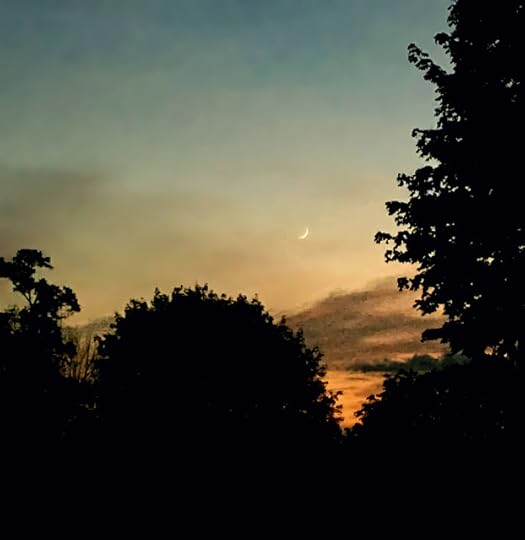

Published on August 24, 2020 17:25
August 23, 2020
The Desire of Our Hearts For "True Gladness"

We ask the Lord our God, our Father, to fill our hearts with His love, to change us, to give us a new life that is beyond anything we could ever have imagined if He hadn't made us for it and called us to it. We ask Him to fix our hearts on that place where true gladness is found.
I want to point out some of the really profound "Collect" prayers that we have on the Roman rite liturgical calendar around this time of year. Last week's and the current week's prayers (i.e. the twentieth and twenty first weeks of Ordinary Time) are great examples.
Here is the prayer from last week:

Here we acknowledge the transcendence of God, and also the transcendence of our own destiny. Our God is "above all things" and has destined for our fulfillment "good things which no eye can see," the joys of communion with Him. We have a supernatural destiny which is beyond ourselves while also made accessible and intimate to our humanity by God's loving initiative, His grace in Jesus Christ.
Grace engenders a relationship of love: God loves us in such a way that we are empowered to love Him and "attain" His "promises." He reveals and gives this new life to us through Jesus, who is the meaning of our existence and all of creation. Here "we pray" to God our Father, we ask Him to "fill our hearts" with His love so that we are moved and changed and transformed that love. His love "warms" our hearts, engages them, forges within them a new way of experiencing and responding to reality and to Himself. Grace enables us to love Him "in all things" as well as "above all things," so that in this world in which we live we already begin to find Him and be drawn by Him.
Jesus who has taken our humanity wants to transform the depths of our hearts so that through His love our "human desire" will surpass itself. We are called to 'lose ourselves' not in some nihilistic way, but with the confidence that in communion with the Trinity we will enter into a mysterious 'beyond' in which nevertheless we will also 'find ourselves' and the goodness of all things in a super-eminent way.
God's grace has already called us and prepared this destiny for us, which we can only attain through a loving and hopeful faith in Jesus. In the Church's prayer we ask for the grace that enables us to grow in this living faith, to move forward in the journey to our fulfillment.
The prayer for the current week is similarly rich in the way it touches upon the essentials of freedom, grace, and destiny:

There is a beautiful reference here to the communion of the Church, in the sense of the unity we share in moving forward together toward a "single purpose," a unity which God has already given us through baptism into the death and resurrection of His Son Jesus. Here too, we are asking to grow on the path toward fulfilling His purpose. We ask God to give us a greater measure of love for His will and desire for His promise, so that faith and hope may also be strengthened and focused on "that place where true gladness is found."
Again and again we see that the "hinge" of the Collect each week is found in words such as "grant us, we pray" or some similar form of asking God - in His love and mercy for us - to give to us that which is the foundation and the vitality of our gift of ourselves to Him, in love.
This corresponds to His grace working in us, His Holy Spirit transforming us through Jesus Christ our Lord.
Published on August 23, 2020 17:24
August 22, 2020
Mary the Gate of Dawn, the Mother of Mercy
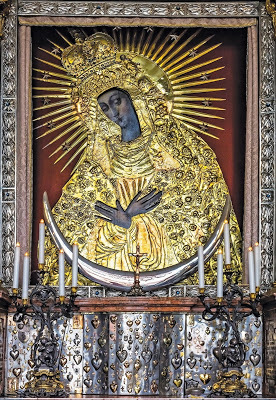 On the feast day that one might call the "Octave of the Assumption" - the celebration in which we honor the "Queenship" of Mary - I have found myself drawn to to an icon that is little known in the West, but that represents an important "meeting place" for Baltic peoples and Slavs, for Latin Catholics and Byzantine Orthodox.
On the feast day that one might call the "Octave of the Assumption" - the celebration in which we honor the "Queenship" of Mary - I have found myself drawn to to an icon that is little known in the West, but that represents an important "meeting place" for Baltic peoples and Slavs, for Latin Catholics and Byzantine Orthodox.Some years ago, I obtained an inexpensive print of the icon of the Virgin Mary called "Ostrobramska." The image was fascinating and distinctive, but the accompanying description - unfortunately for me - was in Russian.
Today that wouldn't be too much of a problem; I could just scan it with my phone and use the app of my choice. The English that popped up wouldn't be pretty, but I'd at least be "in the ballpark." But this was long before Google Translate. In fact, it may have been before "Google anything"!
I probably used "the World Wide Web" to search for information, with the dial-up modem and the dong-dong-bidong noises and the waiting and waiting... and hoping no one else needed to use the phone (because there was only one "phone line" in the house, but... never mind: kids, ask your parents and they'll tell you what it was like
Published on August 22, 2020 16:08




